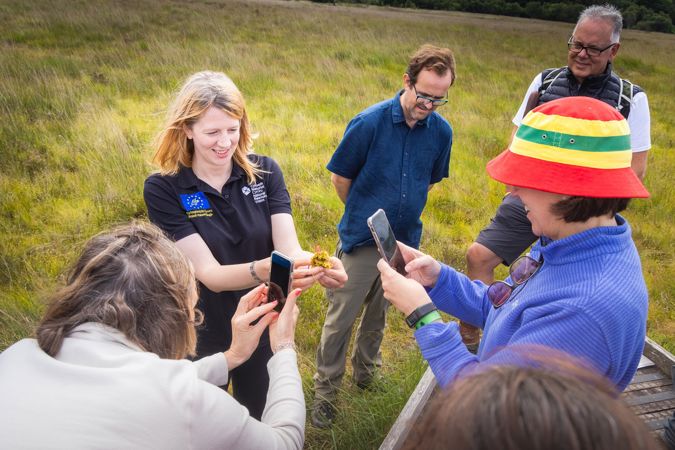Welsh economy boosted by wide-ranging benefits of peatland project

A peatland restoration project helping to tackle the climate and nature emergencies in Wales is having wider positive impacts on Wales’ economy, a report has revealed.
The report was commissioned to assess the socio-economic impact of Natural Resources Wales’s (NRW) EU LIFE funded LIFE Welsh Raised Bogs project since it started its work to restore seven important peatland sites across Wales since 2018.
From job creation to using local suppliers, the report shows that the project has boosted the Welsh economy by millions and contributed significant social benefits to local communities over its lifetime.
Economic indicators focused on the impact on the local economy and employment, whilst social indicators focused on local communities, volunteering and awareness, and understanding, of the habitat.
The report shows that, since 2018, the project has created 23 fulltime equivalent (FTE) job years within NRW, contributing £229,000 annually, on average, to Wales’s economy over the last four years. The project is due to continue this economic contribution until June 2024 following a successful extension application.
Non-staff expenditure has totalled £2.02 million This includes spending on contractors, infrastructure, and equipment to deliver the project objectives of habitat restoration, monitoring, and public engagement.
Of this total over £1.24 million (61%) was spent inside Wales, including £652,000 (32%) being spent in the local economy (within 10 miles of a project site). This expenditure has created a further 13.2 FTE job years in Wales as a result of employment by contractors and other suppliers to the project.
The project has now been extended until June 2024.Overall, the forecast economic benefits to Wales are expected to amount to a contribution of over £3.85 million to the Welsh economy, and the creation of 94 FTE job years.
Jake White LIFE Welsh Raised Bogs project manager said “We are very pleased with the results of this study and are grateful to everyone who took part. Our project has many and varied impacts, the majority focus on improving the habitats, but to also understand the socio-economic impact of our work is fascinating.”
“The report also contains case studies which show that the project has helped individuals forge new careers in Wales and encouraged Welsh businesses to invest in the future of peatland restoration.”
The social impacts of the project were measured through online and in-person surveys open to the public and phone conversations with specific key stakeholders, such as landowners. The results are very positive, with 60% of the public reporting a noticeable impact on their awareness of the project sites and their varied importance.
80% of respondents reported noticing personal benefits from visiting the project sites. The most common benefits reported were an improved knowledge and understanding of raised bogs, their history and wildlife, and an improved appreciation for the value of peatlands.
This was followed by an increased connection to their local area, and pride over their local nature reserve. 50% of respondents also reported both improved fitness and mental health.
Half of respondents reported seeing improved education and learning opportunities regarding peatlands, and their conservation value. Whilst 40% of respondents also reported an increased use of the project sites by local people for recreation.
This was particularly relevant to the larger sites such as Cors Caron National Nature Reserve (NNR) and Cors Fochno which is part of the Dyfi NNR where the majority of the work has been concentrated. These responses suggest that there are a variety of social benefits from the project.
Similarly, 100% of respondents believed that the raised bogs were an important part of the landscape, with 69% of respondents having visited either Cors Caron or Cors Fochno in the six months prior to the survey. 42% of these were inspired to visit as a result of the project’s influence.
Volunteers contributed to over 66 days (13 weeks) of volunteering over the project period, however the data is incomplete, and therefore this is likely to be an under-estimate.
The majority of the contractor expenditure (65%) took place at Cors Caron NNR, with a further 20% at Cors Fochno. The remainder was spread over the five other sites involved in the project.
The report was written by Cumulus Consultants, an independent consultancy providing research, analysis and insight to the land and environment sectors, in association with TACP, a multi-disciplinary environmental consultancy based in Wales.
To read the summary of the report please visit Natural Resources Wales / New LIFE for Welsh Raised Bogs: Evaluating the impact on people and the economy
